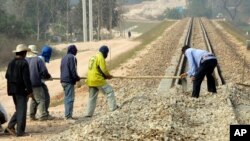China and Laos are both committed to a high-speed rail project linking the Chinese southwestern city of Kunming with the Lao capital of Vientiane, officials from both countries said this week, and the project will go ahead despite delays.
The line should eventually stretch through Thailand and Malaysia to Singapore, and is part of an ambitious plan for China to develop infrastructure links across Asia, known as the "One Belt, One Road" project.
Vientiane hosted an elaborate ground-breaking ceremony for the $7-billion project in December, but nearly eight months later, construction has yet to begin in Laos.
Work has been delayed because Laos had yet to complete an environmental and social impact study, said a former deputy prime minister, Somsavat Lengsavad.
"The terms are all concluded, they are not changing," he told Reuters in an interview at the prime minister's office in Vientiane. "But the Chinese banks are very strict on us fully complying on the environment and social impact study."
Somsavat ran the steering panel for the project for Laos until he retired early this year, and still maintains close contact with the ministries involved, he said.
Another issue was land allocation around the line, he added, with some land on the route having been snapped up by investors speculating ahead of government purchases. "There is no work on the ground," he said. "It is pending the study, and one of the pending problems is land reallocation."
Reports that the Lao government was renegotiating the terms because it felt Somsavat had struck a deal that favored China were untrue, he said, adding that China would not get rights to develop land along the route.
China will hold a stake of 70 percent in the joint venture project, and Laos the rest, he said. Initial capital would be around $2.1 billion, with Beijing funding Laos' contribution of $630 million with a loan at interest below 3 percent, he added.
Another reason for delays was that responsibility for the project had changed hands between ministries in China, he said.
But Beijing has also struggled to make progress in Thailand, as negotiating teams have disagreed on financing, cost and land rights.
"We will continue to push forward the construction of this rail project," China's Foreign Minister Wang Yi told reporters on the sidelines of a meeting of Southeast Asian nations this week. "It will bring benefit to people from both countries."
